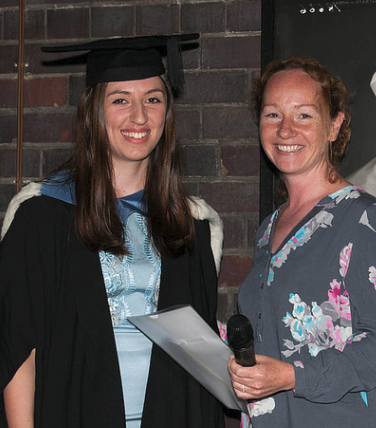
This summer saw 12 students graduate from the University of Liverpool with BSC degrees in Tropical Disease Biology. Many of the students attended taught modules within the LSTM with numbers approaching 60 in some sessions.
This year’s best student prize and performance was awarded to Antonia Lombardi who scored the year’s highest marks. Antonia conducted a three-month research project on cerebral malaria with Professor Alister Craig and secured a first-class degree. Antonia has written a short article of her experiences here.
Antonia writes: “I came across Tropical Disease Biology while looking for Biomedical courses, when I was applying for university. Whilst there is a lot of overlap between the concepts and learning material, Tropical Disease Biology jumped out at me as being much more fascinating. Firstly, there is a focus on the effects of disease on global health as opposed to simply concentrating on biological systems, and it covers aspects of biology such as parasites and vectors in far more detail than any other course would. Naturally, the opportunity to learn this in collaboration with LSTM made this choice even more appealing.
In our first year at university all Life Sciences students share the same modules, but in our second year we got the opportunity to work at LSTM on a tropical disease practical skills course where we really got a taste for Tropical Disease Biology. We learnt to identify malarial infections in blood and schistosome eggs in stool, explored insecticide susceptibility, and used ELISA to detect liver fluke infections; all really exciting skills to learn as a second year student.
In our third year, most of our lectures took place at the LSTM. All of them were really interesting, but one of my favourite modules was Topics in Global Health, where each week we would learn about a new health issue that affects populations in tropical climates, such as snake bite and gender inequity. We also embarked on research projects that are set by LSTM, so it was very hard to narrow down all the choices! The project I chose was a literature review that revolved around why adjunct therapies for cerebral malaria may be ineffective, and the implications of this. I started my project knowing very little about the topic, but thanks to the assistance of my supervisor (and a lot of research!) I left with a very new perspective, and a much better understanding, of malarial disease.
Tropical Disease Biology is a small course, and many of the modules we undertook involved small numbers of people. This made lectures much more personal, and our lecturers were very approachable. As many of the lecturers are simultaneously carrying out their own research it also meant that we were taught new, cutting edge material. I am very proud to say that I was a part of such a fascinating and unique degree. The lessons we learnt about disease and public health are widely relevant and very important, and I hope to have a chance to put this knowledge to good use by working for health-related organisations in fighting diseases and raising awareness. I would like to thank everyone who contributed to making these last three years the best they could be!”